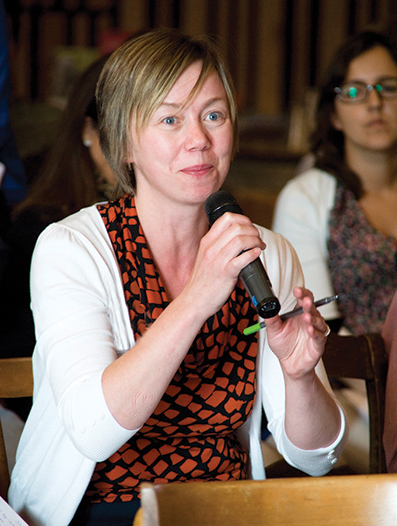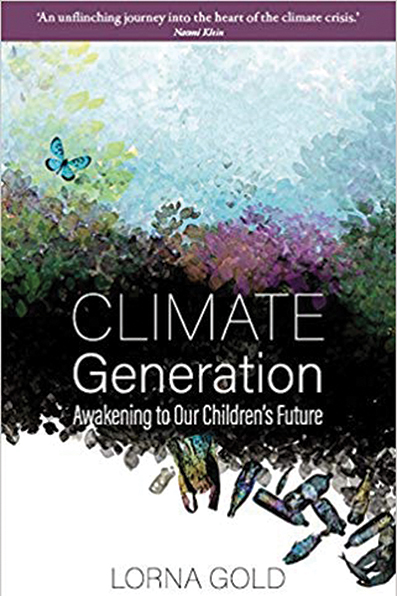Trócaire’s Lorna Tevnan Gold on saving the future from the present.
℘℘℘
Dr. Lorna Tevnan Gold of the Irish humanitarian organization Trócaire has been working to change environmental policy and appealing to the public to see climate change for the impending disaster already-in-motion that it is for the past 15 years, and now she’s written a book about it.
Climate Generation – Awakening to Our Children’s Future explains in layman’s terms what we face if we don’t start making effective changes immediately.
Yet it is not the harbinger of doom that many such treatises are. Gold maintains that the matter is urgent because there is still time to make a difference. “Yes, the situation is very, very challenging,” she confirmed at our meeting in June, “but we can still do so much.”
Recently, Trócaire has been encouraging Irish institutions to review investments through an ecological mindset. A resounding success came with the Irish government’s announcement in November 2017 that the sovereign wealth fund would be completely divested from fossil fuels, becoming the first government in the world to make that pledge. “It’s a real leadership,” Gold said, with “Ireland really punching above its weight internationally, showing leadership on this link between our investments and our approach to sustainability in the climate.”
As Gold notes, Ireland can be credited with spreading climate change awareness from the beginning. Irish physicist John Tyndall (born in County Carlow in 1820) uncovered the mechanics of how the atmosphere absorbs heat, and noted that the substances that took in the most were water vapor, carbon dioxide, and ozone.

Ireland’s involvement in the battle against climate change makes a good deal of sense, considering what the island has to lose. Gold elaborates, “What the scientists have told us is that we’re going to see wetter weather in the west and increasing coastal flooding and tidal surges, affecting cities like Cork in particular. And then on the east coast, we’re going to see a dryer climate, and more droughts.” The Irish ecosystem is as delicate as it is intricate – the emerald of the isle has been cultivated by centuries of consistent weather patterns. The country simply cannot afford the climate instability predicted in the coming years.
Yet in spite of regular discussion in politics and media, the matter remains non-urgent to, in Gold’s words, the “ordinary folks on the street, who are just getting on with life.”
Her book tackles this by veering from the mainstream of climate change literacy, speaking to the most instinctive, visceral response humans are wired to have: protecting their children. “When I do the climate talk, I’m Lorna, the mum, who has the two boys, who also knows something about climate change. And that disarms people.” she says. “It becomes something that’s more human interest and relatable,”
Her unique approach was inspired while at the park with her sons. “I was looking around to see this lovely scene of parents who just adore their kids. Everybody loves their children, and we all want the best for our kids. And there was just this sense in my head, like, ‘Why is it?’” she remembers, shaking her head. “It’s not that people are ignoring climate change because they’re bad or they feel guilty; there’s just a huge communication gap, and my question was: what would it take to overcome that? What does it take for people to actually see that this is something that affects them personally?”
So she wrote things down from her perspective, and interviewed family, neighbors, and friends for their take, and worked closely with her good friend John Sweeney, Ireland’s leading climatologist, and the author of the foreword to the book, to be firm on the finer points of the science. Thus Climate Generation was born – to make it clear whose future is at stake.
“People say to me, ‘Why do you care about climate change?’ And I’ll go, ‘I don’t care about climate change,’” Gold clarifies. “‘I care about my children. I care about the future. I care about the world.”
“‘And it just so happens that there’s this big problem called climate change,’” she says with a knowing smile; she’s made this speech before. “‘It’s getting in the way of a safe future for our children.’ When you turn it round like that, people listen.”
“There’s so many solutions. That’s the thing: on one hand it’s the hope, and it’s also the tragedy of the situation. The tragedy is that we have the solutions in front of our eyes, and if we choose to change, we can salvage a lot of the future for our kids.” ♦


Leave a Reply